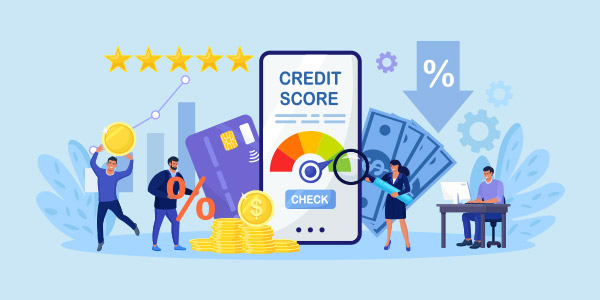Homebuyers
Understanding Your FICO Credit Score
May 20, 2021
Many of your financial investments depend on a single three-digit number: your credit score. This number is derived from your financial history and helps determine what kind of loans or lines of credit you may qualify for.
Your credit score may be often referred to as your FICO score, and vice versa, but they are not the same thing. Don’t worry, we’ll explain everything. With that in mind, let’s dive into FICO scores, credit scores, and how they impact you.
It is important to be aware of your credit score and know whether you need to make improvements to your credit, especially if you are considering buying a home.
What is a FICO Score?
The FICO score is a credit scoring model that is used most by lenders and credit providers. It was developed by the Fair Isaac Corporation, which is now known as FICO, having adopted the name of its popular credit score.
The FICO score credit scoring model uses a numerical value that determines your creditworthiness and scores can range from 300 to 850. Lenders consider people with lower scores to be at a higher risk of defaulting on their loans and those with higher scores to be at a lower risk.
The interest rate on your loan may potentially be affected by your FICO score, which means that those with higher credit scores will likely be able to receive a lower interest rate since those people will be seen as less risky than others with a lower credit score. Keeping your credit score high will save you money in the long run.
Is a FICO Score the Same as a Credit Score?
FICO score and credit score are terms that are often used interchangeably, but in fact, a FICO score is a type of credit score and is just one of several credit scoring models that are available.
Most mortgage lenders, including New American Funding, use what is known as a tri-merge credit report when determining your creditworthiness.
A tri-merge report provides the lender with detailed information about a person’s financial situation as well as credit scores from the three major credit reporting agencies – Equifax, Experian, and TransUnion – organized into a single report.
Your three credit scores may vary as each score is based on the information the credit bureau has on file for you.
When utilizing the tri-merge credit report, lenders typically use the middle of the three scores they receive from the credit reporting agencies. If there is more than one borrower on a mortgage, for example, lenders will typically use the lowest of all the middle scores when determining the borrowers’ financial worthiness.
How Is a Credit Score Calculated?
The FICO scoring model uses five different categories to calculate a score. These include:
- Types of credit used
- New credit
- Length of credit history
- Balances owed
- Payment history
FICO’s scoring model considers all of these items when calculating your FICO score. The types of credit used only account for 10% of how your FICO score is calculated while payment history makes a larger impact at 35%. Knowing which elements affect your credit score the most is important – especially when you want to improve your creditworthiness.
What is a Good FICO Credit Score?
As we said earlier, FICO scores range from 300-850. FICO defines a “good” credit score as one between 670-739. According to FICO, people with credit scores in that range are “near or slightly above the average of U.S. consumers,” adding that “most lenders consider this a good score.”
People with FICO scores from 740-799 are considered to have a “very good” rating, meaning their score is “above the average of U.S. consumers and demonstrates to lenders that you are a very dependable borrower,” according to FICO.
Those with a FICO score above 800 are considered to have a rating of “exceptional.”
Additionally, there several steps you can take to improve your score, including paying all your bills on time and reducing the debt you owe on your credit cards.
Where is Your Score Relevant?
When submitting a loan application, your credit score is always at the forefront of a lender's mind. Given that creditworthiness determines how likely you are to pay back your loans, a good credit score is incredibly important when applying for a loan of any sort. Whether you are trying to obtain an auto or home loan, your credit score plays a significant role in the process. It’s not the only thing mortgage lenders are considering, but it is a big piece of the puzzle.
Freddie Mac reported that your credit is one of the most important and necessary elements of applying for a home mortgage.
Can I Get My FICO Score for Free?
Yes, but only through certain means. Several banks and credit card companies provide their cardholders with their free FICO score.
Another way to get a good look at your credit situation is by requesting a free copy of your credit report from each of the three major credit reporting agencies. Under federal law, the agencies are required to provide you with a free credit report each year through AnnualCreditReport.com.
However, due to the COVID-19 pandemic, people can get a free copy of their credit report every week through at least April 2022.
What Other Factors May Lead to a Rejected Loan Application?
Opening multiple lines of credit and cosigning history are two additional elements lenders could potentially view as red flags, according to Bankrate.
Signing up for multiple credit cards in a short amount of time could alarm some lenders.
"That would raise some questions," said Norm Magnuson, the vice president of public affairs for the Consumer Data Industry Association. "It could be an indicator of something that's going on. I don't think it's in the best interest of any consumer to go out there and be a collector of credit lines."
Cosigning is an additional factor that could impact whether you are approved for a loan. While you may not have to pay money when you help someone become approved for a loan, you may pay in other ways. When you cosign, you are also taking on that individual's line of credit. If he or she does not have a good credit score, that can now be associated with your creditworthiness.
In addition, if the individual you cosigned for decided not to make payments or turned them in late, these behaviors would count against you.
Do you have more questions about how credit impacts buying a home? We have more information about credit scores here and more information about buying a home here. Additionally, if you are curious about today’s mortgage rates, you can click here for the latest up-to-date information. For any other questions, our experienced mortgage team is ready to help.






 Smart Moves Start Here.
Smart Moves Start Here.